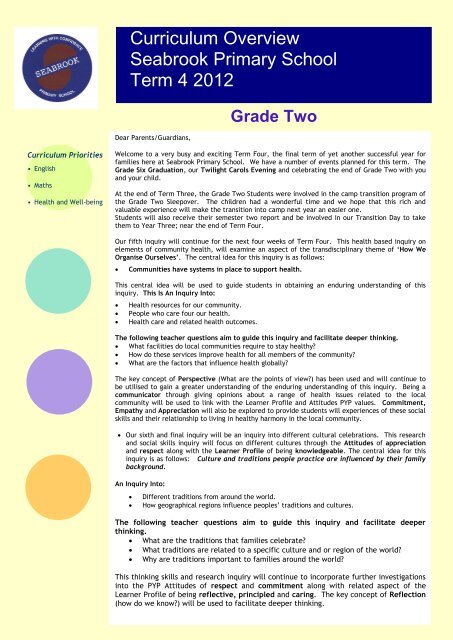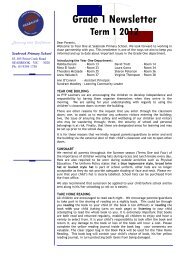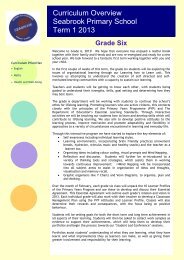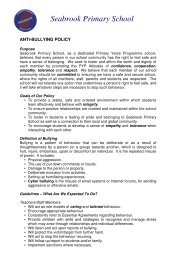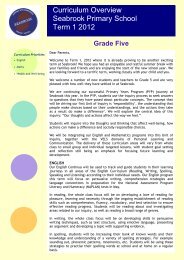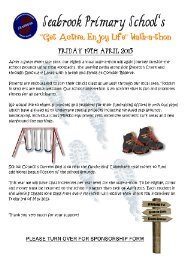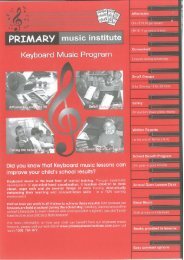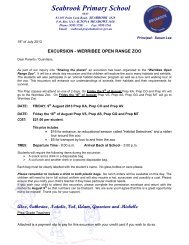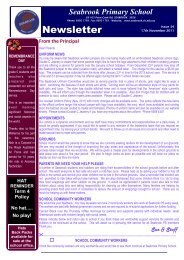Curriculum Overview Seabrook Primary School Term 4 2012
Curriculum Overview Seabrook Primary School Term 4 2012
Curriculum Overview Seabrook Primary School Term 4 2012
You also want an ePaper? Increase the reach of your titles
YUMPU automatically turns print PDFs into web optimized ePapers that Google loves.
<strong>Curriculum</strong> <strong>Overview</strong><strong>Seabrook</strong> <strong>Primary</strong> <strong>School</strong><strong>Term</strong> 4 <strong>2012</strong>Dear Parents/Guardians,Grade Two<strong>Curriculum</strong> Priorities• English• Maths• Health and Well-beingWelcome to a very busy and exciting <strong>Term</strong> Four, the final term of yet another successful year forfamilies here at <strong>Seabrook</strong> <strong>Primary</strong> <strong>School</strong>. We have a number of events planned for this term. TheGrade Six Graduation, our Twilight Carols Evening and celebrating the end of Grade Two with youand your child.At the end of <strong>Term</strong> Three, the Grade Two Students were involved in the camp transition program ofthe Grade Two Sleepover. The children had a wonderful time and we hope that this rich andvaluable experience will make the transition into camp next year an easier one.Students will also receive their semester two report and be involved in our Transition Day to takethem to Year Three; near the end of <strong>Term</strong> Four.Our fifth inquiry will continue for the next four weeks of <strong>Term</strong> Four. This health based inquiry onelements of community health, will examine an aspect of the transdisciplinary theme of ‘How WeOrganise Ourselves’. The central idea for this inquiry is as follows:Communities have systems in place to support health.This central idea will be used to guide students in obtaining an enduring understanding of thisinquiry. This Is An Inquiry Into:Health resources for our community.People who care four our health.Health care and related health outcomes.The following teacher questions aim to guide this inquiry and facilitate deeper thinking. What facilities do local communities require to stay healthy? How do these services improve health for all members of the community? What are the factors that influence health globally?The key concept of Perspective (What are the points of view?) has been used and will continue tobe utilised to gain a greater understanding of the enduring understanding of this inquiry. Being acommunicator through giving opinions about a range of health issues related to the localcommunity will be used to link with the Learner Profile and Attitudes PYP values. Commitment,Empathy and Appreciation will also be explored to provide students will experiences of these socialskills and their relationship to living in healthy harmony in the local community. Our sixth and final inquiry will be an inquiry into different cultural celebrations. This researchand social skills inquiry will focus on different cultures through the Attitudes of appreciationand respect along with the Learner Profile of being knowledgeable. The central idea for thisinquiry is as follows: Culture and traditions people practice are influenced by their familybackground.An Inquiry Into:Different traditions from around the world.How geographical regions influence peoples’ traditions and cultures.The following teacher questions aim to guide this inquiry and facilitate deeperthinking. What are the traditions that families celebrate? What traditions are related to a specific culture and or region of the world? Why are traditions important to families around the world?This thinking skills and research inquiry will continue to incorporate further investigationsinto the PYP Attitudes of respect and commitment along with related aspect of theLearner Profile of being reflective, principled and caring. The key concept of Reflection(how do we know?) will be used to facilitate deeper thinking.
<strong>Curriculum</strong> <strong>Overview</strong> <strong>Term</strong> 4 <strong>2012</strong> – Grade 2Page 2 of 5DISCIPLINE-BASED LEARNING:Throughout the domain of English, the four continua of Speaking and Listening (oral language)Reading, Writing and Spelling will continue to be used to track the progress of individualstudents and to plan for further teaching and learning. Students will also be guided inreflecting on these continua to track their progress and set individual goals for English. Thiswill give students opportunities to gain ownership of their learning and achieving success.In Writing the genre of focus will continue to be writing to persuade (debates, expositions,discussion, arguments, advertisements and letter writing) will be extended on with the use ofthe DeBono Thinking Hats of yellow hat (good points) and black hat (bad points) about issuesrelated to the need for health systems within the local community and explorations into a rangeof different celebrations. Persuasive writing will continue to be modelled and linked toreasoning and arguing a point of view when speaking in both informal and formal situations.Through modelled whole class, shared writing experiences and independent writing tasks therewill be a focus on these following elements: Includes several items about a topic. Joins simple sentences using connectors such as: and, then, so, because, if, next,after, before, first. Participates in group brainstorming activities to elicit ideas and information beforewriting. Perseveres to complete writing tasks. Is beginning to write from another point of view. Beginning to show evidence of personal voice. Extending knowledge of punctuation, e.g. apostrophes, quotation marks. Writing process (Planning, revising, conferencing and publishing).Other writing genres introduced throughout the first Three <strong>Term</strong>s of the year will be revisitedand extended on; to provide students with additional experiences with writing styles toentertain, instruct, explain and recount. Also, students will continuously be included in usingreflective writing as a means of self-evaluation and highlighting areas for possibleimprovement.Editing throughout all genres of writing has been and will continue to be a focus for theremainder of this semester. Strategies such as: re-reading, proofreading while composing andat the completion of tasks will be modelled and prompted along with deletion and addition ofwords to clarify meaning presented in written texts and self-correction of each individualchild’s bank of known sight words will be encouraged.The Writer’s Notebook will continue as a form of encouraging students to write and enjoywriting. The Writer’s Notebook is described as “a seedbed out of which rough drafts grow”.The Writer’s Notebook is defined as a place to experiment, a tool, a way to hold things, adocument of their lives. Students learn to think on the page so their notions of what’s possiblebecome less limited.Teachers will be modelling a range of ‘seeds’ to be used. Entries such as: memories, questions,wonderings, family stories, wishes, dreams, feelings, news,Information, poems, lists etc…The Grade Two Spelling Program will continue to focus on students building their knowledgeand understandings that enables them to become effective spellers. Learning to spell is part oflearning to read and write, therefore the Grade Two Teachers have been and will continue toteach spelling within the context of everyday writing and modelled and guided reading sessionsin order to help students acquire spelling proficiency. Students will be encouraged to use avariety of spelling strategies such as: sounding out, chunking, using memory, using meaning andvisualisation, to spell and learn new words, to automatically recall high frequency words,personally significant words and inquiry words, to continually build their vocabulary and to selfmonitorand generate alternative spellings for unknown words.The spelling program for this term will include: Constant clusters (squ, thr, str, spr, sch, dge, nch) Phonograms (ey, ow, ur, oe) Being aware of the importance of standard spelling for published work.Synonyms (e.g. joyful, elated, glad).Compound words and contractions revision.
<strong>Curriculum</strong> <strong>Overview</strong> <strong>Term</strong> 4 <strong>2012</strong> – Grade 2Page 3 of 5For Reading, teachers will continue to place a strong emphasis on Comprehension with the use ofthe Di Snowball reading comprehension strategies. All reading comprehension strategiesintroduced throughout the year will be revised, with summarising being the main focus for thisfourth term. ‘When you summarize, you are reducing a text to its bare essentials byunderstanding it and putting what you have read into your own words.’ (Snowball, Di – TeachingComprehension 2005).The revisiting of other strategies such as: re-reading, self-correction, reading on and knowledge ofcontent to check understanding of what has been read will also be a continual focus as a means ofpromoting independent reading, confidence and reading fluency.Throughout the continued use of shared, guided and independent reading models, students willexplore: Identifying and talking about different text forms such as: letters, recipes, newspaperarticles, stories and lists. Revision of integrating prediction and substantiation when reading a variety of texts. Revision of demonstrating the understanding that meaning is vested in the words through theuse of the summarising reading strategy. Reads for a range of purposes. Reads familiar texts confidently and can retell major contents from visual and printed texts.For Oral Language students will have continuous opportunities to be involved in whole class, smallgroup and partnership pair/share activities that allow for students to build on their confidence asa communicator. Students will be encouraged to use more lengthy and complex sentences whenspeaking, take conversational turns as speaker and listener, use tone, volume, pace and gesturesto enhance meaning of their conversation and participating in group discussions.Students will have opportunities to utilise speaking and listening aspects of: Cognitive verbs, e.g. think, like, want, etc. to express thoughts, wishes and dreams. Beginning to react according to own perceptions in a conflict situation, but is able toappreciate another’s point of view through adult and peer mediation. Using language to reason and argue. Planning and giving instructions in a variety of situations, formal and informal, e.g. classroomroutines, peer teaching.Students will also continue to be given ample opportunities to share their artefacts as well as theirreflections verbally using the PYP dispositions. Simplistic debates will be introduced to allow forstudents to experience the language associated with reasoning, arguing a point of view anddiscussing the cause and effect of a range of inquiry based investigations. The revision of listeningskills and strategies related to audience social interaction and for everyday use in a range ofsituations has continued to be and will again be focused on to facilitate being a goodcommunicator.Within the domain of Mathematics the consolidation of number, including: place value, addition,subtraction, multiplication and division will be the main focus. Students will investigate therelationship between the four processes and the mental strategies involved e.g. doubles, neardoubles, make to ten, counting on, counting back.The Mathletics and Targeting Mathematics computer programs will continue to be used to caterfor personal learning and to reinforce key mathematical concepts taught. Other ICT experiences ofusing the computer will include the students applying simple transformations to shapes i.e. flips,turns, slides and enlargements. Elements of the mathematics strand of Space, through Location,position and mapping activities will be introduced and explored in conjunction with our inquiryinto health systems in the local community to gain a broader understanding of the lines of inquiry.This will consist of investigations in following directions, diagrams and routes on informal andformal maps. Grid references and positional language of left, right, straight will be incorporatedthroughout these investigations.Within the strand of Working Mathematically, students will have opportunities to use a calculatorwhich will include the use of the constant addition function and the times key in order to checkaccuracy of mental and written estimations, approximations and solutions to simple numbersentences and equations.
<strong>Curriculum</strong> <strong>Overview</strong> <strong>Term</strong> 4 <strong>2012</strong> – Grade 2Page 4 of 5INTERDISCIPLINARY LEARNING:The Thinking <strong>Curriculum</strong>, which includes Mind mapping, Graphic Organisers, Direct AttentionThinking Tools and the Six Thinking Hats will continue to be incorporated throughout this term.These will enable students to stretch their thinking within all areas of the curriculum. GraphicOrganisers in the form of: ‘Y’ charts, Venn diagrams and ‘T’ charts will continue to be utilisedalong with:D.A.T.T. in the form of: C&S (Consequence and Sequel) and FIP (First Important Priorities)The Six Thinking Hats – The yellow hat (good points) and the black hat (bad points) of thecommunity and the red hat (emotions) How do we feel about health systems in thecommunity?, will be used as another means to investigate the inquiry into our localcommunity.Brain friendly practices will continue to be reinforced in classrooms through the use of fruitreading, movement breaks and water bottles on tables to help with the hydration of the brainduring learning and to assist concentration and clear thinking. In <strong>Term</strong> Four, all students willrequire a sun smart <strong>Seabrook</strong> <strong>Primary</strong> <strong>School</strong> hat (these can be purchased from the office area)at school to participate in outdoor activities. The walk-to-school and three fruit and or vegetabledaily eating programs will also continue to be a focus to promote wellbeing and being balanced.The use of ICT will continuously be integrated throughout all curriculum areas. New skills will betaught throughout this final term and students will be guided to use the Internet safely throughthe Internet Safety Program in order to explore various websites and programs related to ourinquiries.PHYSICAL, PERSONAL, EMOTIONAL AND SOCIAL LEARNING:Teachers in the Grade Two department have been and will continue to be using the <strong>Primary</strong> YearsProgramme (PYP) Attitudes and Learner Profile to encourage personal and interpersonaldevelopment. The PYP attitudes of: Appreciation, Commitment, Confidence, Cooperation,Creativity, Curiosity, Empathy, Enthusiasm, Independence, Integrity, Respect and Toleranceare discussed and terminology is constantly used and referred to in regard to the classroomessential agreement. The PYP Learner Profile; are a set of international values that <strong>Seabrook</strong><strong>Primary</strong> <strong>School</strong> uses to promote and encourage children into becoming global citizens. The PYPLearner Profile traits are: Balanced, Caring, Open-Minded, Reflective, Inquirers,Knowledgeable, Thinkers, Risk Takers, Communication, and Principled.The students will also revisit their <strong>Term</strong> Three goals and set new goals for <strong>Term</strong> Four. Again, thisfocus is to direct students and give them ownership and responsibility to their learning. Thispromotes the process of students setting achievable goals for personal learning, highlighting andmaking improvements on strengths and weaknesses.Students will continue to be using the First Steps Continua to track where they are and to set theirEnglish goals. These goals are further used as part of discussions in the end of year student- ledconferences.We would like to thank all parents for their valued contributions and for being active members ofour Learning Community this year. Our Best Wishes to all our Grade Two students as theytranscend into Grade Three.Mr. Gerald Veale, Miss Pamela Tsigros, Miss Lalita Vijendran,Ms. Simone Lazaridis, Ms. Alanna Salt and Ms. Kate StrongGrade Two Teachers
<strong>Curriculum</strong> <strong>Overview</strong> <strong>Term</strong> 4 <strong>2012</strong> – Grade 2Page 5 of 5HEALTH & PHYSICAL EDUCATIONBlair Ganley & Kelleigh EvansLV / PT / AS / SL / KSDuring term four, the grade two students will continue to explore and develop their rangeof skills including, throwing, catching and striking. The main focus will be on two-handedstriking and stick spots (e.g.; hockey, golf and cricket, soft cross) and a Fitness inquiry(working on a range of fitness strategies, skills and games to improve students overallfitness capacities.Students will explore and improve their striking and two handed techniques using a varietyof sports/activities like hockey, cricket, soft cross, badminton and golf. They will focus ontechniques such as: having eyes on the ball/implement throughout the strike, standing sideon to the target, stepping towards with foot opposite to that of the striking hand/arm,sequential hip to shoulder rotation during the strike and following through towards thetarget around the body. They will complete passing, dribbling, shooting, carrying,scooping, trapping, hitting and catching skills connected to each area.Children will participate in a range of fitness based exercises and activities that thestudents will complete on a weekly basis. As well as being fun it will also aim to show howmaintaining a healthy and active lifestyle is important for all of us.The PYP Attitudes and Learner Profiles are consistently used during our Physical Educationsessions. Students are encouraged to reflect on how they are using each PYP Attitude andLearner Profile.Paul CochranDue to family circumstances, a <strong>Curriculum</strong> <strong>Overview</strong> will be sent for Mr. Cochran’s Healthand Physical Education classes at a later date.GVART – Paul CochranDue to family circumstances, a <strong>Curriculum</strong> <strong>Overview</strong> will be sent for Mr. Cochran’s Artclasses at a later date.ITALIAN – Ros Savoia & Paula ThomsonIn term four, the Italian Program will continue to focus on the Italian culture, lifestyle andtraditions. In addition, the children will take part in a unit of work which will include: ‘lafamiglia’ – ‘the family’, ‘il cibo’ – ‘food’ and ‘celebrations’ – ‘Natale’ – ‘Christmas’. Therewill also be an emphasis on children being introduced to and becoming familiar with newvocabulary, new phrases and new greetings in relation to Christmas.The children will take part in many discussions and many oral and written activitiesrelating to these areas. They will be introduced to the language through speaking andlistening – repeating teacher-modelled use of language, verbally responding to questionsasked and through books and stories, songs, poems and chants. The children will also beengaged in the <strong>Primary</strong> Years Programme units of inquiry where possible.The Italian Program will assist in enabling students to be risk-takers, communicators,open-minded, principled, knowledgeable, Inquirers, thinkers, well-balanced, caringand reflective people. The Students will be encouraged to ask questions to betterunderstand the world around them. The students will be provided with opportunities touse language effectively in a range of contexts from informal to formal.


